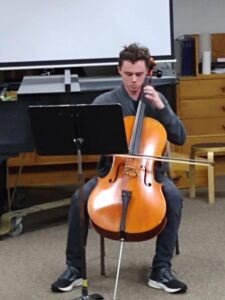More than a decade before I arrived at Gustavus, when I was in third grade, they forced me to play cello.
I was a student at a Waldorf school, an alternative educational philosophy that believes in tying a young person’s education to the way they play and interact with the world. Ideally, it improves executive function, awareness of mind and body, and the way that someone learns new material.
Part of this curriculum meant that we partook in the four-headed terror of juggling, knitting, performing in plays, and selecting a stringed instrument. (Currently, I only actively do one of those four things.) However, it proved to be both a great motivational tool, as well as my gateway into many different unique ways of processing the world.
First, there are the mechanics of playing the cello. Despite its size, the cello cannot be played with much pressure. You have to think of your body as a jello-esque weight that slinks into the instrument and the bow to produce a deep, rich sound. Clenching the bow or the instrument too tightly generates the universally non-melodic screech of nails on a chalkboard.
For me, this was the hardest part of playing cello to grasp. As a symptom of my autism, I used to default to a rigid physical stature and execute a series of stimulating movement patterns to release tension in my body. Because of this, when I took up cello, my mechanics were tight, and after playing I’d be as achy as an athlete after a workout. My teacher, Hanno Strydom, attempted to give me practices to correct my posture and mechanics—to no avail.
It was not until my senior year of high school that I finally broke through. Joseph Englund, one of my high school’s choir directors, who also played cello on the side, was working with me on a solo for Vivaldi’s Concerto for Two Cellos. I was having a hard time adjusting to the speed of the piece. All of a sudden, he went around behind my chair, grabbed my shoulders and elbows, and dropped them down to within my body weight and frame.
I instantly felt as if I was a blob, simply sitting on my instrument. Then and there, my playing became more crisp. I finished practicing, and I wasn’t sore. This was the closest approximation to a miracle that my body had experienced to that point.

My improved cello playing gave me access to music at Gustavus—and to the Jussi Bjorling Scholarship. The then-composer of the Symphony Orchestra, Dr Ruth Lin, was a warm and welcoming presence from my first visit to the College, and she encouraged me to keep playing the instrument. (By the way, shoutout to Sharon Mautner-Rodgers, my current cello teacher. If you want to learn the cello, take lessons with her if you can.)
You may be asking, so what? Why are my cello mechanics, and my cello playing, so important? Well, in addition to improving my executive functioning capabilities, I credit playing the cello for helping me engage even deeper with the liberal arts.
The liberal arts are about much more than going to a “fancy” private school to get a prestigious degree. Consider the words themselves. “Liberal” and “arts” connote freedom, creativity, and self exploration. For many students at Gustavus, this can mean drawing, acting, or extracurricular sports. It teaches management majors about leadership and STEM-focused students about topics such as philosophies of science or patient care in our Nursing program.
In my case, it means keeping up my cello playing all the way through graduation day and beyond. For me, it’s not just about participating in GSO, or meeting my requirements for the Bjorling Scholarship. I find that playing the cello has connected me to expressing myself through music and has exposed me to some of the greatest pieces and composers ever, and to the emotional impacts their work creates.
But most importantly for me, playing the cello simply allows me to relax. Learning the correct mechanics and posture for cello taught me how to untense my body. Some of the breathing I do before performances becomes useful for other high-octane situations, like an exam or a big presentation.
To me, the liberal arts education is all about the expansion of one’s horizons, and the ability to dive into topics you might not have otherwise considered. Take it from someone who was forced to grind through studies on a stringed instrument for the past 14 years: At Gustavus, every seemingly minor topic of study offers its own rewards to be discovered and savored.